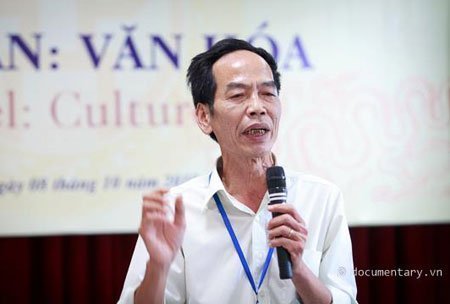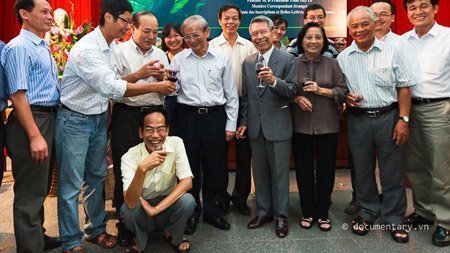
Associate Professor, Dr. Nguyen Hai Ke - former Head of the Department of History, University of Social Sciences and Humanities, VNU
Our teacher Hai Ke was born and raised in a family of teachers in the countryside of Tan Lien, Vinh Bao, Hai Phong. His father was a famous teacher in Vinh Bao, his mother was a traditional woman, fluent in Chinese characters. Perhaps because of that, he inherited all the intelligence of his parents.
After finishing high school, from a student, he became a K.15 student of the History Department, Hanoi University of Science. After graduating from university, he was retained at the History Department as a lecturer, specializing in Ancient and Medieval Vietnamese History (in 1975). From 1987 to 1991, he was a graduate student and completed his associate doctoral thesis (now a doctorate) at the Academy of Sciences of the Soviet Union. From 1992 to 1996, he continued to research and successfully defended his doctoral thesis (now a doctorate of science) at the Academy of Sciences of the Russian Federation. After returning to Vietnam, he continued his work as a historian and teacher, both researching and teaching at the Department of Ancient and Medieval Vietnamese History (Faculty of History, University of Social Sciences and Humanities, Vietnam National University, Hanoi). Also in the late 20th century, Associate Professor, Dr. Nguyen Hai Ke worked side by side with Professor Tran Quoc Vuong to build the Department of Vietnamese Cultural History (now Vietnamese Cultural History and Cultural Studies). In 2000, the first batch of students in this major graduated, many members of the class later received master's and doctoral degrees. In 2002, he received the title of Associate Professor. In 2004, he was the Head of the Department of History, University of Social Sciences and Humanities. After Professor Tran Quoc Vuong passed away (in 2005), he not only took over the position of Head of the Department of Vietnamese Cultural History, but also received the thoughts, wisdom, aspirations and efforts of his predecessor. This was a heavy responsibility, with many ups and downs, but also precious and sacred to him.

A rustic teacher. Photo taken on July 25, 2011 (Photo source: Facebook Luom)
Regarding work, Mr. Ke is a dedicated person, passionate about scientific research and teaching history and culture. His interpretations of history and culture are often perceived thoroughly, sharply and differently from others. That has created a "brand" Nguyen Hai Ke "different" from conventional scientific thoughts and thinking. He does not often/likes to use lofty theories, Western learning to explain the phenomena of Vietnamese history and culture which are pluralistic, capricious, but profound. Instead, he uses his own personal experiences learned/received from the people to explain those scientific issues in a very "worldly" way. He often compares Vietnamese culture to "draft beer" for everyone to drink, regardless of high or low status, power or common people. It can be said that Mr. Ke's scientific perspective and thinking were formed in a process with profound changes in perception.
From a person who did "orthodox" historical scientific research, and was also trained rigorously, systematically, and rationally abroad, in the early stages, his research works on Vietnamese villages in particular and Vietnamese history in general were heavily rational and Western. From the statistical figures based on quantitative foundations and diverse original sources in A Traditional Vietnamese Village in the Northern Delta (Social Sciences Publishing House, Hanoi, 1996), he made correct but unsophisticated conclusions/interpretations, sometimes heavy on numbers. However, from the historical scientific foundation which had no room for emotional/sensual thinking, he moved on to research Vietnamese culture, a field that not only required "accuracy and objectivity" based on quantitative sources and statistics, but also always needed flexibility, suppleness, and sometimes accepted paradoxes. Therefore, in this second stage, the Master moved from the thinking of pure historical science to researching and explaining the phenomena of Vietnamese culture in general and Vietnamese cultural history in particular. This was the stage where he accepted interdisciplinary and transdisciplinary thinking and had fundamental changes in perception. In particular, the knowledge, thinking and style of Tran Quoc Vuong had more or less influenced him. From those fundamental changes in perception, he entered the third stage. The stage where both the intellect and scientific capacity, the personality of Master Ke had reached maturity and depth. Historical scientific thinking blended smoothly with cultural thinking, which allowed him not only to explain cultural phenomena, but also to return to explain the problems of Vietnamese history. From that comprehensive, interdisciplinary and transdisciplinary perspective, historical events or phenomena of cultural and social life, as explained by him, became more attractive, lively and flexible. His thinking showed that scientific issues always need to be re-examined from many different angles, viewpoints, and methods, even accepting opposites. Until his last breath, he had published 98 scientific articles, published 3 books, and successfully accepted 3 scientific research topics at all levels.
In teaching, Teacher Ke believes: “For the majority of people who invest in going to school, taking exams, choosing a major or career, being a teacher is the last choice, not the first in the regulation of Vietnamese society. Therefore, those who, from their youth stepping onto the podium until retirement, remain loyal to the teaching profession are not just content with their fate. Being loyal to the profession with great fortitude, with the courage to self-assess so that not only when they retreat or retreat, they turn to become teachers, but even when they progress or achieve, they do not abandon it, but remain devoted to the profession of being a teacher, to learn together and tirelessly cultivate people (teachers do not tire)”. Therefore, he became a person who inspired learning, scientific research and love of national history not only for those in the profession but also for those outside the profession. New perceptions and scientific insights that emerged during the research process were skillfully incorporated into his “lectures”, conveyed to different audiences in different spaces and circumstances. From lecture halls to bars, wine tables or private homes, students, colleagues and even family members all felt his spirit and simple, easy-to-understand way of speaking. Under his guidance and instruction, generations of students, trainees and researchers have completed their studies. Although they come from different research backgrounds and personalities, they all have one thing in common: they were inspired by Teacher Ke, with knowledge, methods and passion for scientific research. They are following in their Teacher’s footsteps, continuing on the short path of life with joys and sorrows, sweets and bitters, full of tears but worth experiencing. Perhaps this is the greatest achievement for those working in education in general and teaching at the university level in particular. Besides teaching undergraduate students, he has successfully supervised 8 masters and 3 doctoral students.
Personality, knowledge, and intelligence make up/create the scientific character, thinking, and personality of an individual. In other words, scientific character is the clearest and most vivid expression of the personality, knowledge, and intelligence of that person, of that researcher. As for Associate Professor, Doctor of Science Nguyen Hai Ke, he hates hypocrisy, flattery, and flamboyance. He likes the "honesty" and simplicity of people, especially his students. Therefore, his students often love and respect him. In their eyes, in everyday life, he is a smoker, likes to sip beer/wine. Moreover, he is always tolerant, straightforward, does not hold grudges, lives simply, and has a very "peasant" style, so he is easy to approach! He often has a special affection for first-year students (newly admitted to school, still bewildered and confused) with sincere words of encouragement at the beginning of each school year. However, in scientific research and teaching, he was strict, sometimes harsh and very difficult. His attitude was clear between work and play, so lazy students were often scolded, sometimes even "almost" slapped! For his former students, he was not only a professional teacher, but also a spiritual father, always protecting them when they encountered difficulties at work or difficulties in daily life. Going beyond the usual professional knowledge, he used his intelligence, knowledge and experience to explain problems of daily life and behavior in everyday relationships.
In the eyes of the people, Teacher Ke is a familiar person on television. But he "appears on air" not to promote himself, but to inspire patriotism and national spirit through historical knowledge. Because of his "farmer" style, he is close to the people, lives with the people, and learns everyday knowledge from them. Therefore, he is willing to "lie on the ground" to smoke tobacco, exhale passionately with a cup of green tea, and "chat" with the people. Then, he can feel all the atmosphere, rhythm, lifestyle of the village, clan, family and even the daily activities in the countryside, simple. Every time he meets the people, people often call him very intimately: "Uncle Ke"! And this is also the thing, perhaps special, to create a "Brand" Nguyen Hai Ke. Because he is close to the people, he has collected and systematized a rich system of folk knowledge, but not necessarily to write, but to pass on to his students. His lectures, his stories with his students, often begin with the lifestyle, customs, cultural traditions of the students’ families, clans and hometowns. Therefore, folklore is intertwined, integrated with contemporary scholarship and lived with the students’ research practices. Surely, if we hadn’t listened to Mr. Ke’s lectures (and sometimes it wasn’t even a lecture), none of us ignorant students would have understood what “đánh trấn” was?
With the press, he has a very clear attitude. He often does not answer or keeps silent, sometimes outrightly refusing general, innocuous questions. And, when he has answered interviews, the press does not dare to publish them, because "sir, it is too much" or "sir, it is difficult for us!". But everyone who listens likes his frank and straightforward way of answering, sometimes "touching" not only on current events of social life, but also on individuals or decisions with strategic vision... This is also the attitude, courage and personality of a true scientist and teacher, honest with himself, with his students, with his family and society.
It is difficult to define the brand name Nguyen Hai Ke in a "complete" way. These short lines about Associate Professor, Doctor of Science Nguyen Hai Ke are just my personal feelings about the Teacher. And it is certainly not enough, not enough, not finished about a learned, respected Teacher of the field of Vietnamese history and cultural studies. But for us, the image of a tall, thin teacher with a wide forehead, bright eyes and a lopsided figure is imprinted in our minds. Twelve years have passed since my Teacher left this temporary world to return to his ancestors, to meet his mother, father, Professor Tran Quoc Vuong (and now also Professors Phan Huy Le, Ha Van Tan, Dinh Xuan Lam, and many other friends, colleagues, and classmates), but it seems that he has never left us, he still exists and watches over us, still smiles every time we gather, hang out, and still seems to be "irritated" by our "foolishness", "carelessness" and even "laziness" on the journey of researching and discovering Vietnamese history and culture. The existence of each person, perhaps, is not in the physical body, in the time and space in which they exist, but in the settling in the minds of the community. That is the eternity of a person. And perhaps that is why it seems that we, Teacher and students, have never been far away, never been far away!
Hanoi, Autumn of the Year of the Snake (2025)

